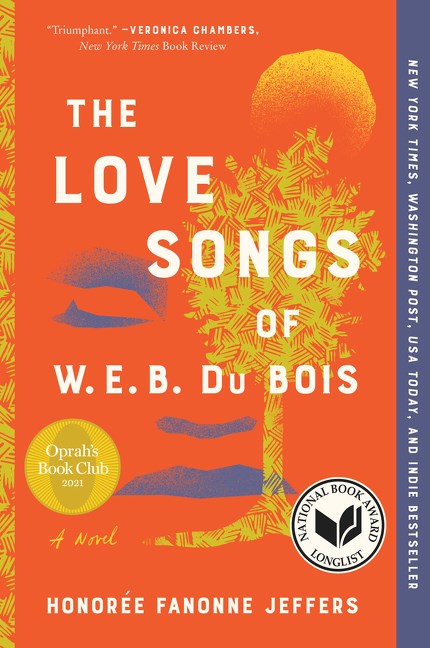Good news for those of us who travel with books: The Love Songs of W. E. B. Du Bois is now available in paperback. The hefty debut novel from award-winning poet Honorée Fanonne Jeffers is over 800 pages, spans over 2 centuries, and only weighs 1.4 pounds in paperback format.
The Love Songs of W.E.B. Du Bois is a true epic, tracking the fictional family history of African-American protagonist Ailey Pearl Garfield back 8 generations in a fashion similar to Yaa Ngasi’s Homegoing. As the story unfolds, we see the tapestry of American history as it is woven together: white European settlers, enslaved Black people kidnapped from Africa, Indigenous people whose land was forcibly taken from them and the interrelationships between them all. Chapters hop back and forth in time between Ailey’s first person narratives and third person histories of her various ancestors, including Beauty, a mixed-race Indigenous Creek, white, and West African girl sold into slavery by her stepmother and renamed Ahgaya, “Uncle Root,” a mixed race Black man who could have passed as white and chose not to, and Belle Driskell Garfield, a Southern school teacher.
The title of the novel refers to the epigraph, an excerpt from Du Bois’ “Of the Sorrow Songs,” in which he writes, “before each thought that I have written in this book I have set a phrase, a haunting echo of these weird old songs in which the soul of the black slave spoke to men.” Similarly to Du Bois’ use of Sorrow Songs, this novel is punctuated by epigrams from Du Bois, which set the tone for the sections that follow.
Ailey, whose ancestors are Scottish, West-African, and Indigenous Creek, is born in Washington, DC in 1973 and spends her summers in Chicasetta, Georgia, where her family has been since the 1740s. As a child, Ailey is haunted, literally, by the traumas in her family line. At the start of the book, Ailey is 3 years old and is visited by a “long-haired lady” in her dreams. We follow Ailey and her two sisters Lydia and Coco through childhood, adolescence, and beyond as they navigate childhood sexual abuse, colorism, addiction, queerness, romance, classism, and education. We follow as Lydia falls in love and into addiction and Coco leaves the state for an ivy league education only to return to Georgia to care for her grandmother. These narratives are interwoven with others that meander back in time to visit the women who preceded them. As Ailey grows older, she attends an HBCU where she meets Dr. Oludara, a history professor who hires Ailey to help organize her research on chattel slavery. Ailey is compelled to become an historian to uncover her family’s roots, and ultimately becomes the only Black history student in her Masters program. Jeffers’ realistic historical fiction highlights the legacy of resilience of women of color in the United States. As Ailey’s uncle Dr. Jason “Root” Freeman Hargrace is reported to have said, “the Negro woman is the best our race has to offer.”
While at times it is hard to follow the many characters and their relationships, the premise is compelling. After all, what is documented in history is shaped by those who hold power. In the United States, it is much easier to trace one’s ancestry if we are descendants of white Europeans than if we are descended from Indigenous people or enslaved Africans. Thankfully, the book comes with a family tree for reference. At its core, this family saga is a deeply American story, one “of a woman’s line. Her people and her dirt, her trees.”
The Love Songs of W.E.B. Du Bois
By Honorée Fanonne Jeffers
Harper Collins
Published August 24, 2021
Paperback Published May 10, 2022


